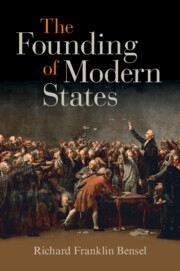Book contents
- The Founding of Modern States
- The Founding of Modern States
- Copyright page
- Dedication
- Contents
- Tables
- Boxes
- Preface
- 1 Introduction
- Part I The Founding of Democratic States
- Part II The Founding of Non-democratic States
- 5 The Dictatorship of the Proletariat
- 6 Blood and Soil
- 7 Islamic Theocracy
- 8 Conclusion
- Index
6 - Blood and Soil
The Founding of the Third Reich
from Part II - The Founding of Non-democratic States
Published online by Cambridge University Press: 27 October 2022
- The Founding of Modern States
- The Founding of Modern States
- Copyright page
- Dedication
- Contents
- Tables
- Boxes
- Preface
- 1 Introduction
- Part I The Founding of Democratic States
- Part II The Founding of Non-democratic States
- 5 The Dictatorship of the Proletariat
- 6 Blood and Soil
- 7 Islamic Theocracy
- 8 Conclusion
- Index
Summary
Adolf Hitler was sworn in as chancellor of the Weimar Republic just before noon on January 30, 1933. Before taking office, the Nazi leader had consented to an alliance with a conservative party in which the latter would hold most of the cabinet seats in the new government. While their coalition would not enjoy a majority in the Reichstag, there had been minority governments and cabinets before this one. And the chancellorship Hitler was assuming was not the most powerful office under the Weimar Constitution; that position was held by Field Marshal Paul von Hindenburg, who had soundly defeated Hitler in the presidential election the previous year. The Field Marshal, in fact, retained authority to dismiss the chancellor and his new government at any time. In all respects, the ritual surrounding Hitler’s oath complied with the formalities of the Weimar Constitution as they had been performed by previous chancellors as they took office. In these respects, the event that ushered Hitler and the Nazi Party into power appeared to be nothing more than another round in the play of parliamentary politics. However, that evening, tens of thousands of uniformed storm troopers, men of the SS (Schutzstaffel, Hitler’s Praetorian guard), and other members of right-wing paramilitary organizations marched through the streets of Berlin in celebration.1 As they saluted the new chancellor, there was no doubt that they embraced his assumption of power as a new founding for the German state.
- Type
- Chapter
- Information
- The Founding of Modern States , pp. 359 - 419Publisher: Cambridge University PressPrint publication year: 2022

